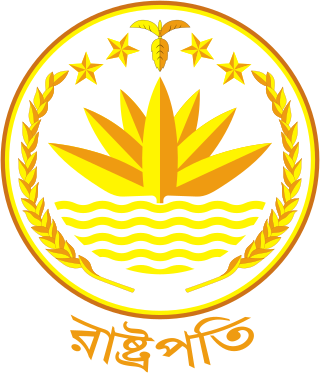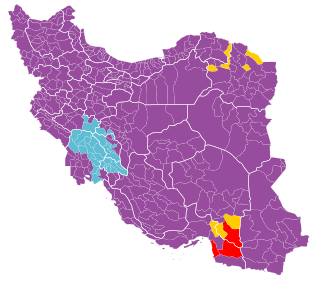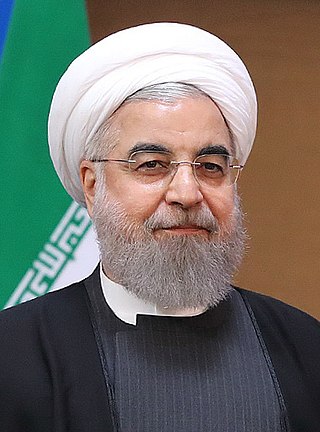
The Bangladesh Nationalist Party is a major political party in Bangladesh. Founded on 1 September 1978 by Bangladeshi president Ziaur Rahman with a view of uniting people with a nationalist ideology, BNP later became one of the two dominant parties in Bangladesh, along with its archrival Awami League. Initially a big tent centrist party, it later moved towards more right-wing politics.

Ali Akbar Hashemi Bahramani Rafsanjani was an Iranian politician and writer who served as the fourth president of Iran from 1989 to 1997. One of the founding fathers of the Islamic Republic, Rafsanjani was the head of the Assembly of Experts from 2007 until 2011 when he decided not to nominate himself for the post. He was also the chairman of the Expediency Discernment Council.

The president of Bangladesh (POB), officially the president of the People's Republic of Bangladesh, is the head of state of Bangladesh and commander-in-chief of the Bangladesh Armed Forces.

In digital recording, an audio or video signal is converted into a stream of discrete numbers representing the changes over time in air pressure for audio, or chroma and luminance values for video. This number stream is saved to a storage device. To play back a digital recording, the numbers are retrieved and converted back into their original analog audio or video forms so that they can be heard or seen.

Mohammad Mohammadullah was the third president of the People's Republic of Bangladesh. Mohammadullah became the Acting President on 24 December 1973, was elected president on 24 January 1974, and took oath of office on 27 January 1974. He remained President until 25 January 1975.
1975 (MCMLXXV) was a common year starting on Wednesday of the Gregorian calendar, the 1975th year of the Common Era (CE) and Anno Domini (AD) designations, the 975th year of the 2nd millennium, the 75th year of the 20th century, and the 6th year of the 1970s decade.
1974 (MCMLXXIV) was a common year starting on Tuesday of the Gregorian calendar, the 1974th year of the Common Era (CE) and Anno Domini (AD) designations, the 974th year of the 2nd millennium, the 74th year of the 20th century, and the 5th year of the 1970s decade.
1973 (MCMLXXIII) was a common year starting on Monday of the Gregorian calendar, the 1973rd year of the Common Era (CE) and Anno Domini (AD) designations, the 973rd year of the 2nd millennium, the 73rd year of the 20th century, and the 4th year of the 1970s decade.

Presidential elections were held in Iran on 14 June 2013. Hassan Rouhani was elected in the first round with over 50% of the vote. Tehran Mayor Mohammad Bagher Ghalibaf finished second with 17% of the vote. Voter turnout was 73%.

Shazia Ilmi is an Indian politician and the national spokesperson of the Bharatiya Janata Party since July 2021.

Hassan Rouhani is an Iranian politician who served as the seventh president of Iran from 2013 to 2021. He is also a sharia lawyer ("Wakil"), academic, former diplomat and Islamic cleric. He served as a member of Iran's Assembly of Experts from 1999 to 2024. He was a member of the Expediency Council from 1991 to 2013, and also was a member of the Supreme National Security Council from 1989 to 2021. Rouhani was deputy speaker of the fourth and fifth terms of the Parliament of Iran (Majlis) and Secretary of the Supreme National Security Council from 1989 to 2005. In the latter capacity, he was the country's top negotiator with the EU three, UK, France, and Germany, on nuclear technology in Iran, and has also served as a Shia mujtahid, and economic trade negotiator.

Mohammad Shariatmadari is an Iranian politician and current CEO of Persian Gulf Petrochemical Industries Corporation since December 2024.

The following lists events that happened during 1981 in Iran.

The Vice President of Bangladesh was the second highest constitutional office in Bangladesh when the country was governed under a presidential system. The vice-president was the first person in the presidential line of succession, in the event of a president's resignation, removal or death. The post was held by several Bangladeshi statesmen during different periods of the country's history. The inaugural office holder was Syed Nazrul Islam during the Liberation War and the final office holder was Moudud Ahmed before and during '90's Mass Uprising although Chief Justice Shahabuddin Ahmed was ceremoniously appointed on demand to the office by Ershad replacing Moudud Ahmed, so that Shahabuddin could constitutionally become acting president following Ershad's resignation in 1990. Abdus Sattar was the only vice-president to succeed to the presidency in 1981.

The Bengal Provincial Muslim League (BPML) was the branch of the All India Muslim League in the British Indian province of Bengal. It was established in Dhaka on 2 March 1912. Its official language was Bengali. The party played an important role in the Bengal Legislative Council and in the Bengal Legislative Assembly, where two of the Prime Ministers of Bengal were from the party. It was vital to the creation of the Dominion of Pakistan, particularly after its election victory in 1946.

Since the independence of Bangladesh, the presidential election process has been changed several times due to both the presidential and parliamentary arrangements. According to the Second Schedule to the Constitution of 1972, the president of the parliament used to be elected by a secret vote. Later, according to the fourth amendment to the constitution, the provision of the direct election system of presidential election was introduced. But soon after 12th Amendment to the Constitution, the provision of presidential elections through an indirect election was introduced after the parliamentary system was installed. At present, the president is elected by an indirect election by the members of parliament as per Article 48 of the Constitution.

The 2018 Bangladeshi presidential election was held on 18 February 2018. It was the seventh presidential election held since the Twelfth Amendment changed how the president gets elected. The tenure of the incumbent president was set to end on April 23, 2018. Earlier, on January 25, 2018, the Election Commission announced the election schedule. Incumbent president Mohammad Abdul Hamid was nominated for the second time as the candidate to run for election by the ruling party. Hamid was declared president by the Election Commission as no other candidate submitted nomination papers to the commission. He was sworn in by the Speaker of the Jatiya Sangsad Shirin Chaudhury on April 24, 2018. With the result of the election, Hamid became the first incumbent president to be reelected in the history of Bangladesh.

The Cook County, Illinois, general election was held on November 6, 2012.

Ilmi Orvokki Kangas was a Finnish politician. She represented Vaasa in the Parliament of Finland from 1970 to 1983 as a member of the Centre Party. From September 1976 to May 1977, she was Finland's second minister of social affairs and health, appointed by Prime Minister Martti Miettunen.

Adrian Fontes is an American politician and attorney. A member of the Democratic Party, he has served as the Secretary of State of Arizona since 2023, after defeating Republican nominee Mark Finchem in 2022. Fontes previously served as the Maricopa County Recorder from 2017 to 2021.



















